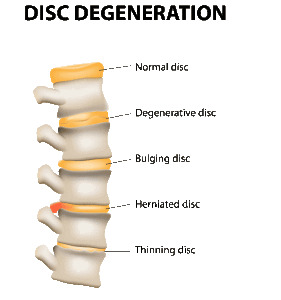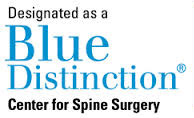What’s the Difference between Degenerative Disc Disease and a Herniated Disc?
 As spine experts, we often encounter patients struggling with back pain caused by various conditions. Two commonly misunderstood conditions are degenerative disc disease (DDD) and herniated discs. While they both affect the spinal discs, they have distinct characteristics, causes, and treatment approaches. Let’s take a look at the differences between the two and shed some light on their causes, symptoms, and available treatment options.
As spine experts, we often encounter patients struggling with back pain caused by various conditions. Two commonly misunderstood conditions are degenerative disc disease (DDD) and herniated discs. While they both affect the spinal discs, they have distinct characteristics, causes, and treatment approaches. Let’s take a look at the differences between the two and shed some light on their causes, symptoms, and available treatment options.
Degenerative Disc Disease (DDD)
Degenerative disc disease refers to the natural wear and tear that occurs in the spinal discs over time. Despite its name, DDD is not a disease but rather a degenerative condition. As we age, the intervertebral discs between the vertebrae lose their elasticity and cushioning properties. This can lead to various symptoms and discomfort. Let’s examine the causes, symptoms, and treatment options for degenerative disc disease.
Causes of Degenerative Disc Disease
- Aging: The primary cause of DDD is the natural aging process. As we get older, the discs in our spine lose water content, reducing their flexibility and shock absorption capabilities.
- Genetics: Some individuals may have a genetic predisposition to developing degenerative disc disease. Inherited traits can affect the structural integrity of the discs, making them more susceptible to degeneration.
- Lifestyle Factors: Certain lifestyle factors can contribute to the development and progression of DDD. These include smoking, obesity, poor nutrition, and physical inactivity.
Symptoms of Degenerative Disc Disease
The symptoms of degenerative disc disease can vary from person to person. Common symptoms include:
- Back pain: Persistent or intermittent pain in the lower back or neck region, depending on the affected area of the spine.
- Radiating pain: Pain that radiates into the buttocks, hips, or legs (in the case of lumbar DDD) or into the arms (in the case of cervical DDD).
- Stiffness and reduced flexibility: Difficulty in performing certain movements or bending due to stiffness and reduced range of motion.
Treatment Options for Degenerative Disc Disease
For the vast majority of patients who present with low back pain or radiating nerve pain emanating from the neck or low back, nonoperative treatment is successful. Such modalities as chiropractic care, physical therapy, anti-inflammatory medication, and occasionally epidural steroid injections are often used. Surgery is rarely considered for degenerative disc disease except for the most refractory of cases.
Herniated Disc
A herniated disc, also known as a slipped or ruptured disc, occurs when the soft inner material (nucleus pulposus) of a disc protrudes through a tear in the tough outer layer (annulus fibrosus). Let’s explore the causes, symptoms, and treatment options for herniated discs.
Causes of Herniated Discs
- Age-related degeneration: Similar to degenerative disc disease, the natural aging process weakens the discs, making them more prone to herniation.
- Trauma or injury: An injury or trauma to the spine, such as a fall or sudden impact, can cause a disc to herniate.
- Repetitive strain: Repeated bending, lifting heavy objects, or performing activities that involve twisting motions can increase the risk of disc herniation.
Symptoms of Herniated Discs
The symptoms of a herniated disc vary depending on the location and severity of the herniation. Common symptoms include:
- Back or neck pain: Localized pain at the site of the herniated disc.
- Radiating pain: Pain that travels along the path of the affected nerve, often into the buttocks, legs, or arms, causing numbness, tingling, or weakness.
- Muscle weakness: Weakness in certain muscle groups controlled by the affected nerves, which can lead to difficulty in performing certain activities.
Treatment Options for Herniated Discs
The majority of patients recover with nonoperative treatments that help to control pain and improve physical activity. Anti-inflammatories, oral steroids, physical therapy, chiropractic care and occasionally epidural steroid injections into the spine are used to alleviate the patient’s symptoms. Patients improve as the body may resorb the herniated disc fragment by immunologic means as a foreign body would be resorbed in the skin such as a splinter. For patients with significant neurologic deficit, surgery is often indicated. This includes patients who fail at least six weeks of nonoperative care or who have significant neurologic impairment early or those who are unable to walk, and the results of surgery for relieving a patient’s radiating arm or leg pain caused by a herniated disc are quite predictable.
Conclusion
While both degenerative disc disease and herniated discs affect the spinal discs, they are distinct conditions with different causes and treatment approaches. Degenerative disc disease is a natural part of the aging process, while herniated discs are often caused by trauma or injury. Understanding the underlying causes, recognizing the symptoms, and exploring the available treatment options can help individuals find relief and improve their quality of life. If you experience persistent back pain or suspect a spinal condition, please give us a call. Our qualified spine specialists can provide an accurate diagnosis and recommend the most appropriate treatment plan for your specific condition.
